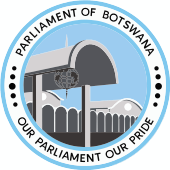The National Assembly of Botswana Palamente ya Botswana | |
|---|---|
| 13th Parliament | |
 | |
 | |
| Type | |
| Type | |
Term limits | None |
| History | |
| Founded | 1966 |
| Leadership | |
Dithapelo Keorapetse since 7 November 2024 | |
Deputy Speaker | Helen Manyeneng, UDC since 7 November 2024 |
Duma Boko since 1 November 2024 | |
Leader of the House | Ndaba Gaolathe, UDC since 7 November 2024 |
Government Whip | TBD, UDC |
Opposition whip | TBD, BCP |
| Structure | |
| Seats | 69 |
 | |
Political groups | Government (43)
Official opposition (15) Other opposition (10) Presiding officer (1)
|
Length of term | 5 years |
| Elections | |
| First-past-the-post | |
First election | 1 March 1965 |
Last election | 30 October 2024 |
| Meeting place | |
 | |
| National Assembly Chamber Gaborone South-East District | |
| Website | |
| www | |
 |
|---|
| Constitution |
|
|
The National Assembly is the sole legislative body of Botswana's unicameral Parliament, of which consists of the President and the National Assembly.[2] The House passes laws, provides ministers to form Cabinet, and supervises the work of government. It is also responsible for adopting the country's budgets. It is advised by the Ntlo ya Dikgosi, a council of tribal chiefs which is not a house of Parliament.[3]
Though there were legislative predecessors to the National Assembly during colonial rule, it was not until independence in 1966 that the National Assembly of Botswana officially formed.[4][5] Since then, there have been consistent multi-party elections and 5 peaceful presidential transitions.[6][5]
Currently, there are 65 total members of the National Assembly.[7] Voters in single member constituencies directly elect 57 of these members for a term of 5 years through a plurality (or first-past-the-post) system. Six members, meanwhile, are nominated by the President and elected by the assembly. Finally, the remaining two (the President and Speaker of the National Assembly) are ex officio.[8][9]
Despite the presence of consistent elections, the National Assembly has not escaped criticism. In every election since the founding elections in 1965 until 2024, the Botswana Democratic Party won a majority of seats in the legislative body. [10][11] Additionally, political science scholars have sometimes expressed concern about the National Assembly because of its few women MPs and its interconnectedness with the executive.[12][13]
Cite error: There are <ref group=lower-alpha> tags or {{efn}} templates on this page, but the references will not show without a {{reflist|group=lower-alpha}} template or {{notelist}} template (see the help page).
- ^ a b "FAQs". parliament.gov.bw. Parliament of Botswana. Retrieved 22 July 2021.
2 are Ex-officios being the President and The Speaker
- ^ Botlhale, Emmanuel; Lotshwao, Kebapetse (2013). "The Uneasy Relationship Between Parliament and the Executive in Botswana". Botswana Notes and Records. 45: 39–51. JSTOR 90024373.
- ^ Norton, Philip (21 December 2004). "How many bicameral legislatures are there?". The Journal of Legislative Studies. 10 (4): 1–9. doi:10.1080/1357233042000322436. S2CID 143950774.
- ^ Lewis, Stephen R. Jr. "Explaining Botswana's Success: The Importance of Culture - Carleton College". www.carleton.edu. Retrieved 2022-03-10.
- ^ a b Tesfahun, Amsalu Tebeje (2015). "The Endurance and Decline of Single Party Dominance in African States: A Case Study of Botswana and Senegal". Ethiopian Journal of the Social Sciences and Humanities. 11 (1): 1–28.
- ^ "Botswana: African miracle or African mirage?". africasacountry.com. 4 March 2018. Retrieved 2022-03-10.
- ^ "Botswana's ruling party BDP wins general election: Chief justice". www.aljazeera.com. Retrieved 2022-03-10.
- ^ "Botswana 1966 (rev. 2016) Constitution - Constitute". www.constituteproject.org. Retrieved 2022-03-10.
- ^ "Office-Bearers & Members". www.parliament.gov.bw. Retrieved 2022-04-20.
- ^ Poteete, Amy R. (2012). "Electoral competition, factionalism, and persistent party dominance in Botswana". The Journal of Modern African Studies. 50 (1): 75–102. doi:10.1017/S0022278X11000619. JSTOR 41474960. S2CID 154672233.
- ^ "Botswana: législatives sur fond de crise économique – Jeune Afrique". JeuneAfrique.com (in French). Retrieved 2022-03-14.
- ^ Bauer, Gretchen (2010). "'Cows Will Lead the Herd into a Precipice': Where Are the Women MPs in Botswana?". Botswana Notes and Records. 42: 56–70. JSTOR 23237971.
- ^ Sebudubudu, David; Maripe, Bugalo; Botlhomilwe, Mokganedi Z.; Malila, Ikanyeng S. (2013). "The Mutation of Parliament into a 'Registration Chamber': Executive Dominance over the Legislature in Botswana". The African Review: A Journal of African Politics, Development and International Affairs. 40 (2): 33–59. JSTOR 45341655.